Transferts monétaires et mobilité humaine
Les transferts monétaires sont souvent utilisés lors de crises afin de répondre aux besoins des personnes migrantes. Dans cette page, vous trouverez des ressources sur les transferts monétaires et la migration.

La Croix-Rouge se prépare à fournir une aide humanitaire aux migrant·es de la caravane sur le point de quitter le Honduras pour le Guatemala.
©Johannes Chinchilla / FICR.
Conflits, crises économiques et catastrophes sont autant de raisons ayant contraint des personnes à fuir et à traverser des frontières dans des conditions éprouvantes et risquées, en quête de sécurité et de moyens de subsistance. En 2020, le nombre de personnes déplacées de force s’est envolé au niveau sans précédent de plus de 80 millions de personnes, soit près du double du nombre enregistré il y a une dizaine d’année. Cette tendance s’aggrave et les effets du changement climatique menacent de déplacer jusqu’à 200 millions de personnes d’ici 2050.
L’assistance monétaire est de plus en plus utilisée afin de répondre aux besoins des personnes en situation de déplacement. On y a eu recours à grande échelle dans différents contextes de migration, en Europe en 2015 jusqu’au Venezuela pour « los caminantes ». Elle a également été utilisée dans d’autres crises migratoires, notamment en Amérique centrale, au Sahel, en Méditerranée et dans la Corne de l’Afrique. L’assistance monétaire est à l’heure actuelle l’une des principales formes d’aide apportée aux populations déplacées en Ukraine et dans les pays voisins.
Il existe une myriade de perspectives et de définitions concernant le mot « migrant·e » et la façon dont les humanitaires doivent agir. C’est pourquoi nous ne choisissons pas une définition unique pour le moment, étant donné que les discussions sur l’assistance monétaire et la migration en sont encore à leurs prémices et que le langage évolue encore.
Documenter et partager les données probantes donnera lieu à des interventions plus efficaces. Cette page contient une sélection de ressources utiles concernant la migration et le recours à l’assistance monétaire. Elle sera mise à jour au fil des discussions ayant lieu dans les espaces humanitaires des transferts monétaires.
Priorités actuelles
Afin de contribuer aux progrès relatifs à cet enjeu, nous nous engageons à :
- soutenir la création de données probantes aux niveaux régional et mondial ;
- contribuer aux solutions pratiques visant à mettre en œuvre les transferts monétaires auprès des personnes migrantes ;
- organiser des discussions sur les enjeux majeurs basées sur des données probantes.
Contenu récent
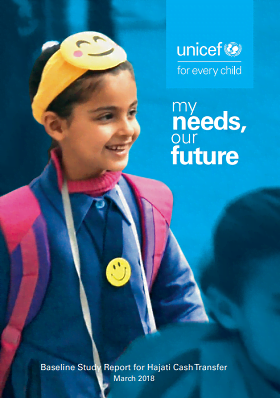
My Needs, Our Future
Report
Since the beginning of the 2017-2018 school year in Jordan, the United Nations Children’s Fund (UNICEF) Child Cash Grant (CCG) launched its new phase, an equity-driven, integrated social protection programme for all children in Jordan called Hajati, or ‘my need’ in Arabic. The new programme built on...
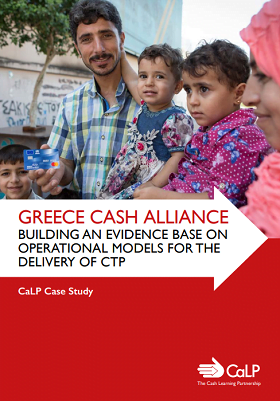
Greece Cash Alliance: Building an Evidence Base on Operational Models for the Delivery Of CTP
Report
The primary aim of this case study is to map out aspects of the Greece Cash Alliance (GCA) operational model influencing key drivers of quality (effectiveness, efficiency and accountability) in the delivery of multipurpose cash grants (MPGs). The GCA was launched in April 2017 with funding from ECHO, in...
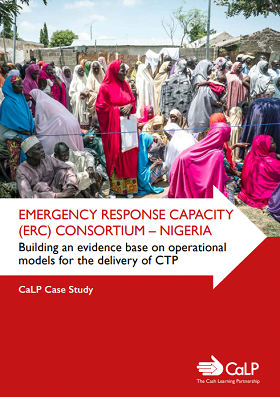
Emergency Response Capacity (ERC) Consortium – Nigeria: Building an evidence base on operational models for the delivery of CTP
Report
This case study aims to review and map out how aspects of the Enhanced Response Capacity (ERC) consortium model have influenced key drivers of quality (effectiveness, efficiency and accountability) in the consortium’s Nigeria pilot. Formed at the global level in 2015, the ERC Consortium is comprised of...

The CALP Network East Africa Members Consultative Discussion
Event

Mission Wrap-Up: Ten Key Findings
Guidelines and Tools
Joint Donor Mission on cash programming to Jordan and Lebanon 4-8 February 2018
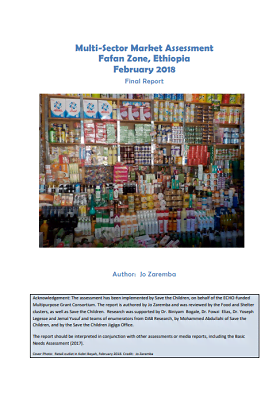
Multi-Sector Market Assessment Fafan Zone, Ethiopia
Report
This report covers the findings of the Multi-Sector Market Assessment (MSMA) conducted in Fafan Zone, Ethiopia in February and March 2018. The assignment formed part of the ERC-MPG Consortium on Approaches to Transformative Humanitarian Cash Transfer programming and is intended to support joint,...

The State of the World’s Cash – Résumé
Rapport
Le présent rapport analyse de façon critique l’état actuel des transferts monétaires dans le secteur de l’aide humanitaire et mesure les progrès faits par rapport aux engagements pris, afin de donner des éclairages qui
permettraient de les accélérer.
Le rapport est structuré selon les six...
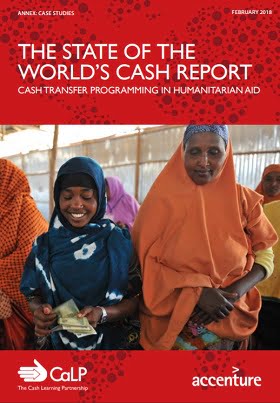
The State of the World’s Cash Report – Annex: Case studies
Report
1 Nepal – scaling up cash transfer programming (CTP) after a rapid onset disaster
2 Turkey – Working with host governments to deliver cash-based assistance during the refugee crisis 3 Zimbabwe – Lessons from the ‘Emergency Cash First Response’ to drought-affected communities 4 Democratic...
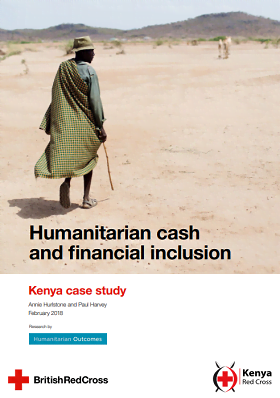
Humanitarian Cash Transfers and Financial Inclusion
Report
A case study on Kenya Red Cross Humanitarian Cash Transfers and Financial Inclusion along the Kenyan Coast. The study examines the extent to which humanitarian e-transfer beneficiaries increase their access and use of formal financial services and products such as payments, savings, credit or insurance.

State of the World’s Cash: Slides
Presentation
About this report: Commissioned by the the CALP Network. Delivered by a team of CALP staff, Accenture Development Partnerships & experts. Purpose: an objective review of the state of Cash Transfer Programming (CTP) in humanitarian aid today, in order to: (a) assess progress compared to commitments and...

Geneva-based Cash Working Group – Presentation 2018
Presentation
Geneva-based Cash Working Group – Presentation 2018
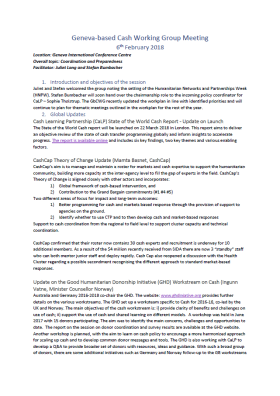
Geneva-based Cash Working Group Meeting – 6th February 2018
Guidelines and Tools
Geneva-based Cash Working Group Meeting – 6th February 2018

The State of the World’s Cash Report
Report
This major publication from the CALP Network aims to provide a neutral and critical analysis of the current state of cash and voucher assistance (CVA) globally, including the extent to which it is contributing to quality in programming and outcomes for people in need.

Cash and Markets Working Group Strategic Workshop Report – Libya
Report
On the 6th and 7th of February 2018, a two days meeting opened to the members of the CMWG, Sector Leads, World Bank, UNSMIL, OCHA and Donors was held in Tunis to review the achievements, gaps and challenges of cash programing and articulate the 2018 humanitarian Cash Strategy for Libya. Supported by a...
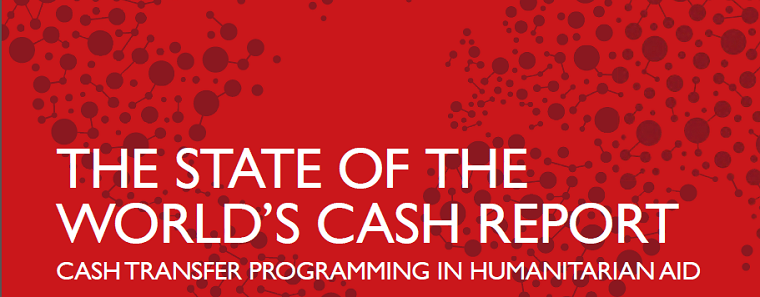
State of the World’s Cash Report Launch Events
Event

Announcing: State of the World’s Cash launch event
Blog Post
Join us at ODI on 1 February 2018 for the launch of the 2018 State of the World's Cash Report. The State of the World's Cash report critically analyses the current state of CTP in humanitarian aid, and the extent to which commitments have been achieved, in order to provide shared insights that can...
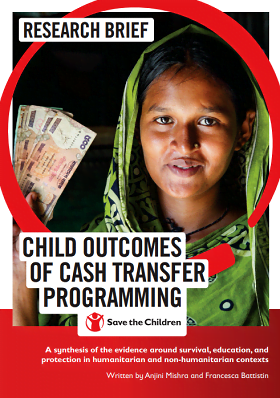
Child Outcomes of Cash Transfer Programming: Research Brief
Report
Humanitarian emergencies are increasing in both frequency and duration. It is evident that children bear the brunt of these situations and that these experiences have long-lasting effects on their development and future. The figures for the number of children affected by humanitarian emergencies are...

Transfer Values in Kenya’s National Social Security System
Report
This report, commissioned by the World Food Programme (WFP) and United Nations Children’s Fund (UNICEF) seeks to examine the current transfer values of Kenya’s tax-financed social security schemes and assess whether they are set at an appropriate level. Transfer Values in Kenya’s National Social...

Assessing the effects of a combined economic and social intervention in Uganda on child protection and economic outcomes
Presentation
Presentation showing preliminary findings from USAID-funded Aspires Family Care Project, implemented by FHI360, ChildFund International and AVSI. Economic strengthening activities including cash transfers, VSLAs, matched savings accounts and others were shown to reduce families’ economic vulnerability...

Le genre et les transferts monétaires : Répercussions de la prise de décisions au sein des ménages sur la nutrition des femmes et des enfants en Éthiopie
Case Study
La relation entre le genre et l’assistance monétaire dans les contextes humanitaires
est mal comprise. Les interventions sont bien trop souvent définies à partir de suppositions plutôt que de faits réels.
Afin de comprendre comment l’assistance monétaire est bénéfique à tous, les acteurs de...